|
|
|
Sort Order |
|
|
|
Items / Page
|
|
|
|
|
|
|
| Srl | Item |
| 1 |
ID:
117483
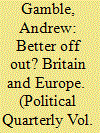

|
|
|
|
|
| Publication |
2012.
|
| Summary/Abstract |
The largest ever rebellion of Conservative MPs on Europe took place in October 2011 with 81 Conservative MPs defying the Conservative whip to vote for a referendum on Britain's continued membership of the European Union. This resurgence of dissent over Europe has been fuelled by the crisis in the eurozone. The Conservative party is now an overwhelmingly Eurosceptic party, but Conservative Eurosceptics are divided over whether the Government should use the opportunity of the eurozone crisis to take Britain out of the European Union, or whether it should seek to negotiate a looser arrangement, or do nothing at all. Conservative policy on Europe has been further complicated by the coalition with the Liberal Democrats, and by the consequences for the British economy if the eurozone disintegrates. Public opinion is also divided. British policy on the European Union remains ambivalent and muddled because British aims are inconsistent, and because there is no consensus on where Britain's interests truly lie.
|
|
|
|
|
|
|
|
|
|
|
|
|
|
|
|
| 2 |
ID:
065736
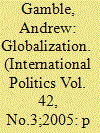

|
|
|
| 3 |
ID:
133230
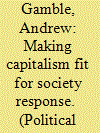

|
|
|
|
|
| Publication |
2014.
|
| Summary/Abstract |
In 2008 the neoliberal order was rocked to its foundations by the greatest financial crash since 1929. Five years on, however, we are still living in a neoliberal world. The basic structures of the neoliberal order are still in lace. Bankers still expect their bonuses, and chief executives still expect to be paid several hundred times the remuneration of their lowest paid employee. Deflation has replaced inflation as the new threat to prosperity, living standards are frozen or falling, and the economy can only be kept going by more 'privatised Keynesianism', boosting demand by increasing personal debt and borrowing
|
|
|
|
|
|
|
|
|
|
|
|
|
|
|
|
| 4 |
ID:
046570
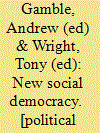

|
|
|
|
|
| Publication |
Oxford, Blackwell Publishers, 1999.
|
| Description |
viii, 185p.
|
| Standard Number |
0631217657
|
|
|
|
|
|
|
|
|
|
|
|
Copies: C:1/I:0,R:0,Q:0
Circulation
| Accession# | Call# | Current Location | Status | Policy | Location |
| 045495 | 335.5/GAM 045495 | Main | On Shelf | General | |
|
|
|
|
| 5 |
ID:
165552
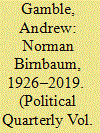

|
|
|
|
|
| Summary/Abstract |
norman birnbaum, who has died at the age of 92, was a highly valued and regular contributor to Political Quarterly over many years. In 2011 he received the Crick Prize at the Orwell Awards for the best article in PQ in 2010. He travelled to London especially for the prize and delivered a memorable speech. The prize was awarded for his article ‘American progressivism and the Obama presidency’ (PQ 81:4) and was typical of his writing which always embodied the qualities PQ exists to promote—engaged, direct, authoritative, and written in plain English. Norman was a public intellectual of a rare kind.
|
|
|
|
|
|
|
|
|
|
|
|
|
|
|
|
| 6 |
ID:
152567
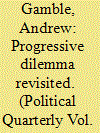

|
|
|
|
|
| Summary/Abstract |
In his book of the same title, David Marquand identified the progressive dilemma faced by many intellectuals since the beginning of the twentieth century as a question of whether it was better to work through a political party or through civil society to achieve reform. This dilemma was sharpened by the emergence of the Labour party as the main challenger to the Conservatives, because the party was so closely identified with the defence of a particular interest. This hindered the creation of the kind of broad electoral coalition that could win general elections. Throughout most of its history, Labour has failed to realise its promise and sustain reforming governments. In this article, the history of the Labour party over the past hundred years is outlined, in particular the three cycles 1931–51, 1951–79 and 1979–2010 and the divisions and recriminations that have followed each period in government. The current predicament of the party is then briefly assessed.
|
|
|
|
|
|
|
|
|
|
|
|
|
|
|
|
| 7 |
ID:
104801
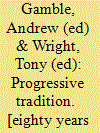

|
|
|
|
|
| Publication |
Susex, Wiley-Blackwell, 2011.
|
| Description |
323p.
|
| Standard Number |
9781444349931
|
|
|
|
|
|
|
|
|
|
|
|
Copies: C:1/I:0,R:0,Q:0
Circulation
| Accession# | Call# | Current Location | Status | Policy | Location |
| 056055 | 321.8/GAM 056055 | Main | On Shelf | General | |
|
|
|
|
| 8 |
ID:
058467
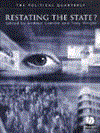

|
|
|
|
|
| Publication |
Massachusetts, Blackwell Publishing, 2004.
|
| Description |
vi, 159p.
|
| Standard Number |
1405124547
|
|
|
|
|
|
|
|
|
|
|
|
Copies: C:1/I:0,R:0,Q:0
Circulation
| Accession# | Call# | Current Location | Status | Policy | Location |
| 049068 | 320.1/RES 049068 | Main | On Shelf | General | |
|
|
|
|
| 9 |
ID:
086981


|
|
|
|
|
| Publication |
2009.
|
| Summary/Abstract |
ON the eve of the first world war Leonard Schapiro, Aged Six, was on a train journey from Glasgow to Riga, during which a German official entered the carriage and, seeing the nanny chafing the little boy's feet, exclaimed. Cold feet, cold feet! Soon all Englishmen will have cold feet! The war that was soon to erupt was a war within a civilization, and also a war fought on the German side against the ascendancy of the dominant liberal idea of that civilization, an idea it associated above all with England.
|
|
|
|
|
|
|
|
|
|
|
|
|
|
|
|
|
|
|
|
|